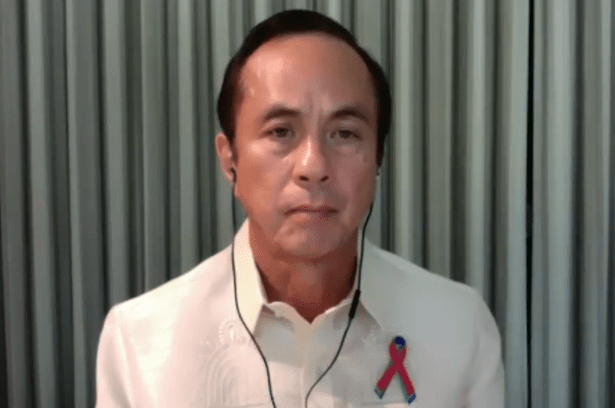
ABS-CBN chairman emeritus Eugenio Lopez III answers questions from lawmakers via videoconferencing on Wednesday.
Lawmakers grilled ABS-CBN chairman emeritus Eugenio “Gabby” Lopez III over his dual citizenship on Wednesday, but the former network boss got the backing of the Department of Justice, which said he never lost his Filipino citizenship.
This allowed him to be part of the management of ABS-CBN Corp,, because being born of Filipino parents automatically conferred him natural-born status even if he was also an American citizen by virtue of birth on US soil, Justice Undersecretary Emmeline Aglipay-Villar said.
Two House committees spent three hours questioning Lopez over whether he gave up being Filipino by reciting the US oath of allegiance or acquiring and using a US passport, and whether he had to perfect his Filipino citizenship when he applied for recognition from the Bureau of Immigration in 2001.
Lopez’s American citizenship was brought up as among supposed violations committed by ABS-CBN in its application for a new legislative franchise. The 1987 Constitution bans foreign ownership of mass media.
The network was shut down on May 5 a day after its 25-year franchise expired, in a move widely condemned as an attack on press freedom and free expression. In February, Solicitor General Jose Calida accused ABS-CBN of numerous violations in a “quo warranto” petition before the Supreme Court, months after President Rodrigo Duterte said he would make sure ABS-CBN won’t get a franchise renewal.
Lopez said he was committed to helping Filipinos and would die in the Philippines, and renounce his US citizenship if it presented any conflict of interest.
“I grew up in the Philippines and I went to grade school and high school in the Philippines. I only went to college and my masters in America. When you go to college in America, it does not ask you to make an oath of allegiance,” Lopez told lawmakers.
“It is the trust that has been given to me and in fact, I always tell our employees dito sa ABS-CBN, it’s not just a job, it is a calling. So please, if you are going to look beyond the technicality and talk about allegiance, please look at my record over the last 35 years.”
Aglipay also said having an American passport didn’t mean Lopez lost his Philippine citizenship. “At ang hindi naman niya pagkakaroon ng Philippine passport ay hindi rin isang dahilan na hindi siya maging Pilipino,” the justice official said.
That Lopez filled up an alien fingerprint document was also not an issue because the ABS-CBN chairman emeritus was a natural-born Filipino who merely sought recognition as a dual citizen, and dual citizens are not barred from the management of media entities, said Cagayan de Oro Rep. Rufus Rodriguez, a former immigration commissioner. Natural-born status is moreover a qualification for dual citizenship under Philippine law, he said.
An unclear photocopy of the document was presented by Sagip party-list Rep. Rodante Marcoleta to the committees, but was not accepted as it was not a certified true copy.
“Mr. Lopez from the very, very beginning by birth is a Filipino. Being a Filipino, Mr. Lopez may own a part of and also participate in the management of a mass media company,” Rodriguez said.
Failing to establish that Lopez had lost his Filipino citizenship, Anakalusugan party-list Rep. Mike Defensor, backed up by Marcoleta, argued that if barangay officials are required to renounce foreign citizenship, owners of mass media should do likewise. But this is a requirement imposed only on elected officials, not business owners, said Lopez’s lawyer, Mario Bautista.
The House committees on legislative franchises and good government have opted to tackle issues raised against ABS-CBN one by one, and will resume the hearings on Monday.
With the House’s decision to prolong the proceedings, Senate Minority Leader Franklin Drilon had said the fate of ABS-CBN and its 11,000 employees rested on the Supreme Court, which is hearing the network’s petition questioning its closure.
The Senate cannot tackle the ABS-CBN franchise as the constitution requires such bills to emanate from the House. (PressONE.ph)